let's see.
batam hills. wavemaster. holland village. bbq half-chicken. cineleisure. walk the line. syriana. sight and sound. bras basah. looftop. tanned skin. coffee bean. clothes hanger and an annoying mother. scene it. borders. car sick. hostel. naked man. brokeback mountain. chatuchak. mrs. henderson presents. siam paragon. munich. grand egv. press pass. ian. kenny. jameson. film market. good night, and good luck. walk out. heading south. odete. don't tell. consequences of love. rize. four films in a row. smoothie mania. dj station. claudy. daniel. stoned. river queen. willem dafoe. the most commercially successful film last year. joni. patpong. dasa book. overrated balcony. zefri. mandy. alexis. wayne. match point. wrong massage. kenneth. cocktail. holiday inn. 17-baht airport trip. objectifs. capote. rubbing skin. tone.
in a much shorter exclamation: exhaustingly fun!
Feb 28, 2006
Feb 18, 2006
(i'm off to) Bangkok International Film Festival (again? no! it's) 2006 (get it? :D)
This happened not that long time ago, not in a galaxy far away.
We see NAUVAL, recently graduated from some university, down on his luck while doing odd jobs by being an assistant to some lecturers at some local university, a teacher at a local high school, a translator of some god-knows-what-kind-of-textbook, a tutor giving private tuition, basically the low-salary-next-to-nothing jobs under the sun.
Wait! Why does this happen again at present time? Oh, that's another story :)
Anyway, it was one afternoon when we saw this poor fella staring blankly to the flickering screen of the TV on a living room, and his DAD approached him in a casual manner.
D(ad): How are you, Nov?
N(auval): Well, fine.
D: So, how's everything?
N: Just like that.
D: Not going out?
N: Nah, not feeling like to.
D: Okay. Not doing your jobs?
N: No tuition today, teaching at schools only on Saturdays, and uni's on break, so ... yeah.
D: Okay. (reaching his wallet, taking out a note of 100 thousand rupiahs) Here!
N: Huh? What's this?
D: Consider it as a loan, but make sure that you only use it to rent DVDs, and nothing else. Got it?
N: (puzzled, then excited) Sure!
If I'm not mistaken, I have returned the money back once I got the income from those odd jobs, or more like recently? Wait, I have returned the money back, right?! Yes, I have. Whew.
The reason why I still remember the scene to date, as you may guess, is simply the fact that I can't be more thankful of having people surrounding me who understand my passion over films, in a way that they may not be able to easily accept at face value. And I realize a cloud of doubts hanging above their heads on thinking, "You have not settled yourself yet, but you are going for a film festival?"
Shall I answer the question?
I'd rather not to, but do allow me to excuse myself for going to Bangkok for the event you see on the title of this entry.
I can't believe that I can have this journey again, after the first time last year was marred with some unfortunate stuff that should not have happened on the first place, if I had strong willingness to prevent it from happening.
But I have to admit that I have quite an expectation to my companion this time as he is quite a regular to some of the more established film festivals the world has had throughout this time. Yes, I do hope I can learn from Kenny more about the fun film-festival experience, and it's gonna be joyful time ahead, let's hope so!
Oh well, shall I take a break then from blogging?
Let's just wait and see ;)

We see NAUVAL, recently graduated from some university, down on his luck while doing odd jobs by being an assistant to some lecturers at some local university, a teacher at a local high school, a translator of some god-knows-what-kind-of-textbook, a tutor giving private tuition, basically the low-salary-next-to-nothing jobs under the sun.
Wait! Why does this happen again at present time? Oh, that's another story :)
Anyway, it was one afternoon when we saw this poor fella staring blankly to the flickering screen of the TV on a living room, and his DAD approached him in a casual manner.
D(ad): How are you, Nov?
N(auval): Well, fine.
D: So, how's everything?
N: Just like that.
D: Not going out?
N: Nah, not feeling like to.
D: Okay. Not doing your jobs?
N: No tuition today, teaching at schools only on Saturdays, and uni's on break, so ... yeah.
D: Okay. (reaching his wallet, taking out a note of 100 thousand rupiahs) Here!
N: Huh? What's this?
D: Consider it as a loan, but make sure that you only use it to rent DVDs, and nothing else. Got it?
N: (puzzled, then excited) Sure!
If I'm not mistaken, I have returned the money back once I got the income from those odd jobs, or more like recently? Wait, I have returned the money back, right?! Yes, I have. Whew.
The reason why I still remember the scene to date, as you may guess, is simply the fact that I can't be more thankful of having people surrounding me who understand my passion over films, in a way that they may not be able to easily accept at face value. And I realize a cloud of doubts hanging above their heads on thinking, "You have not settled yourself yet, but you are going for a film festival?"
Shall I answer the question?
I'd rather not to, but do allow me to excuse myself for going to Bangkok for the event you see on the title of this entry.
I can't believe that I can have this journey again, after the first time last year was marred with some unfortunate stuff that should not have happened on the first place, if I had strong willingness to prevent it from happening.
But I have to admit that I have quite an expectation to my companion this time as he is quite a regular to some of the more established film festivals the world has had throughout this time. Yes, I do hope I can learn from Kenny more about the fun film-festival experience, and it's gonna be joyful time ahead, let's hope so!
Oh well, shall I take a break then from blogging?
Let's just wait and see ;)

Syriana
From the direction of Stephen Gaghan, the screenwriter of Traffic.
Seeing the above line, we come to a theatre with a pre-occupied idea that what we're about to see will resemble the aforementioned film, and when our expectation is met, the next question should be: how different is it?
Recently, a similar notion occured when The Constant Gardener was released, as the promotional campaign relied heavily on Fernando Meirelles' previous directorial effort in City of God. The former film might share the now-familiar style of puzzling narrative structure as established by the latter, yet his new film still manages to excel on its own, thanks to the strong storyline and the superb turns of the cast.
So is the case of Syriana.
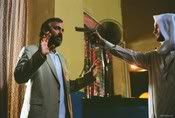
If Traffic takes on a story about several lives affected by drugs problems, then Gaghan's latest film replaces the drug story with a story on how a merger of two giant oil companies in USA could affect the lives of people across the world, or at least, within USA to countries in Persian Gulf area. These people include the impressive cast of actors ranging from the likes of Amanda Peet to Jeffrey Wright, although the spotlight is strongly given to the pigged-out George Clooney, being groomed by many to receive an Oscar soon.
How Academy loves deglamorization of good looks, it is apparent enough, and Clooney might benefit from this, having gained Bridget Jones' weight to give a convincing look as his profilic role of a hired killer. Yet, as cliche as it may sound, it takes Clooney more than his bulging flab to carry the role. His presence in both emotional and ruthless scenes is riveting enough to make us long for more, and the singular scene of his conversation with his distant son is enough to make it as "the moment" shown for his nomination clip.
Yet, being in the flood of equally talented cast, it is still hard to see how he should rise above the others, particularly with always-reliable Jeffrey Wright who lit up the screen with his dignified charisma in otherwise passable role as a clean-cut accountant trapped in the dirty and corrupted world of political issues.
Alas, being a poster boy in the film sparks with mind-challening thoughts that leave its audience beguiled in serious thoughts, Clooney does get an advantage of being noticed from the rest. Thus, the glory awaits.
Seeing the above line, we come to a theatre with a pre-occupied idea that what we're about to see will resemble the aforementioned film, and when our expectation is met, the next question should be: how different is it?
Recently, a similar notion occured when The Constant Gardener was released, as the promotional campaign relied heavily on Fernando Meirelles' previous directorial effort in City of God. The former film might share the now-familiar style of puzzling narrative structure as established by the latter, yet his new film still manages to excel on its own, thanks to the strong storyline and the superb turns of the cast.
So is the case of Syriana.

If Traffic takes on a story about several lives affected by drugs problems, then Gaghan's latest film replaces the drug story with a story on how a merger of two giant oil companies in USA could affect the lives of people across the world, or at least, within USA to countries in Persian Gulf area. These people include the impressive cast of actors ranging from the likes of Amanda Peet to Jeffrey Wright, although the spotlight is strongly given to the pigged-out George Clooney, being groomed by many to receive an Oscar soon.
How Academy loves deglamorization of good looks, it is apparent enough, and Clooney might benefit from this, having gained Bridget Jones' weight to give a convincing look as his profilic role of a hired killer. Yet, as cliche as it may sound, it takes Clooney more than his bulging flab to carry the role. His presence in both emotional and ruthless scenes is riveting enough to make us long for more, and the singular scene of his conversation with his distant son is enough to make it as "the moment" shown for his nomination clip.
Yet, being in the flood of equally talented cast, it is still hard to see how he should rise above the others, particularly with always-reliable Jeffrey Wright who lit up the screen with his dignified charisma in otherwise passable role as a clean-cut accountant trapped in the dirty and corrupted world of political issues.
Alas, being a poster boy in the film sparks with mind-challening thoughts that leave its audience beguiled in serious thoughts, Clooney does get an advantage of being noticed from the rest. Thus, the glory awaits.
Feb 17, 2006
Walk The Line
Taking a cue from the above song (thus the title of the film), James Mangold, the director, certainly takes us in a slow walk while building up our confidence in seeing the transformation of Joaquin Phoenix becoming Mr. Man In Black.
It was a gradual process of seeing Phoenix playing himself in earlier scenes, as if his dashing look is on loan for modeling the period costume. Not until the scene at a verandah where he belted tunes for the first time, we are now taken to a belief that Phoenix has finally inhibited the soul of Johnny Cash in Walk The Line. And of course, the pitch perfect note is in synch with a man being at his fullest with a woman on his side. For Johnny's life, there was June Carter. For Phoenix's impressive tour-de-force performance, it can only be matched by Reese Witherspoon's equally convincing portrayal of June.
And for the latter, it was apparent so much on the screen that Witherspoon injects her own warm personality in bringing out the empathy towards the character that we do not mind watching June with a goody-shoe persona a la Witherspoon herself. Alas, June is given a full of life when she sparks the screen with her determination that is far cry from any of Witherspoon's previous roles where strong willed acts were often imbued with cheekiness, either in Legally Blonde series or Sweet Home Alabama. Seeing Witherspoon in every turn as the country star gives pulsating sensation to the film, in which such a jolt is needed to make the film energetic enough, at least true to the sense of the genre it owes itself to.
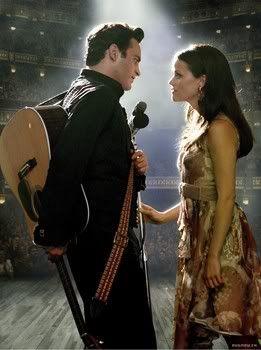
An Oscar gold is only a moment away to hold.
It was a gradual process of seeing Phoenix playing himself in earlier scenes, as if his dashing look is on loan for modeling the period costume. Not until the scene at a verandah where he belted tunes for the first time, we are now taken to a belief that Phoenix has finally inhibited the soul of Johnny Cash in Walk The Line. And of course, the pitch perfect note is in synch with a man being at his fullest with a woman on his side. For Johnny's life, there was June Carter. For Phoenix's impressive tour-de-force performance, it can only be matched by Reese Witherspoon's equally convincing portrayal of June.
And for the latter, it was apparent so much on the screen that Witherspoon injects her own warm personality in bringing out the empathy towards the character that we do not mind watching June with a goody-shoe persona a la Witherspoon herself. Alas, June is given a full of life when she sparks the screen with her determination that is far cry from any of Witherspoon's previous roles where strong willed acts were often imbued with cheekiness, either in Legally Blonde series or Sweet Home Alabama. Seeing Witherspoon in every turn as the country star gives pulsating sensation to the film, in which such a jolt is needed to make the film energetic enough, at least true to the sense of the genre it owes itself to.

An Oscar gold is only a moment away to hold.
Feb 14, 2006
what's killing you?
what has killed me for the past few days turns out ...
that it's not the diarrhoea which forced me to take 3-day bedrest (and not to mention i am not fully recovered yet at the time of writing),
and that it's not about the amazingly fast internet connection, only to be in the same par as how turtles walk and enjoy their time (oh, it annoys me all the time! someone should minister the use of internet in this country!),
but what bugs me the most is ...
i'm having too much infotainment in me!
gosh, holding your tummy while religiously following the breakup of dea mirella and her hubby certainly will not do any good to your mental health.
now, that's what i call a complete murder.
that it's not the diarrhoea which forced me to take 3-day bedrest (and not to mention i am not fully recovered yet at the time of writing),
and that it's not about the amazingly fast internet connection, only to be in the same par as how turtles walk and enjoy their time (oh, it annoys me all the time! someone should minister the use of internet in this country!),
but what bugs me the most is ...
i'm having too much infotainment in me!
gosh, holding your tummy while religiously following the breakup of dea mirella and her hubby certainly will not do any good to your mental health.
now, that's what i call a complete murder.
Shopgirl
Has L.A. been as sophisticated and elegant as what we see in Shopgirl?
The answer is an enthusiastic 'yes', as we know the film is penned by Steve Martin, whose treatment towards the city can be in the same par with how Woody Allen muses New York in his stories.
Only the challenge this time is that Martin writes a screenplay for the film which is based on his own novella. Certainly a lot of reservations are put throughout the script, and that is what exactly translated to the screen. A certain hold-back attitude seems to keep the film on hold from letting it free, confining each and every character within their own designated frames, unmoveable ones.

Unfortunately this does not work to Jason Schwartzman who is more at ease with over-the-top acts as he did in many of his previous comedies. Even being assigned with the role of Jeremy, the supposedly free-spirited artist, Schwartzman only seen comfortable when he conveys more with his meaningful silence rather than goofy acts that he does uncomfortably here.
Magically, the confinement does not work at all towards Martin himself, and the actress playing the title character, Claire Danes. Once again pulling off his ability to play serious roles, Martin brings suave attitude to his character, Ray, that makes us understand wholeheartedly why we do not mind being swooned over by him at the first glance.
On the other hand, Danes, at her most mature role to date, gives her character, Mirabella, a sense of independence through the actress’ radiant presence, which suspiciously resulted from her own confidence in imbuing the role. Danes breathes Mirabella with fragility and strength that only makes her presence riveting and lovable at the same time.
Alas, such character traits understandably bring hope to the film, making it uplifting and charming.
In a hard way, the mission to become a romantic comedy, with a little dark humor a la Martin, is accomplished.
The answer is an enthusiastic 'yes', as we know the film is penned by Steve Martin, whose treatment towards the city can be in the same par with how Woody Allen muses New York in his stories.
Only the challenge this time is that Martin writes a screenplay for the film which is based on his own novella. Certainly a lot of reservations are put throughout the script, and that is what exactly translated to the screen. A certain hold-back attitude seems to keep the film on hold from letting it free, confining each and every character within their own designated frames, unmoveable ones.

Unfortunately this does not work to Jason Schwartzman who is more at ease with over-the-top acts as he did in many of his previous comedies. Even being assigned with the role of Jeremy, the supposedly free-spirited artist, Schwartzman only seen comfortable when he conveys more with his meaningful silence rather than goofy acts that he does uncomfortably here.
Magically, the confinement does not work at all towards Martin himself, and the actress playing the title character, Claire Danes. Once again pulling off his ability to play serious roles, Martin brings suave attitude to his character, Ray, that makes us understand wholeheartedly why we do not mind being swooned over by him at the first glance.
On the other hand, Danes, at her most mature role to date, gives her character, Mirabella, a sense of independence through the actress’ radiant presence, which suspiciously resulted from her own confidence in imbuing the role. Danes breathes Mirabella with fragility and strength that only makes her presence riveting and lovable at the same time.
Alas, such character traits understandably bring hope to the film, making it uplifting and charming.
In a hard way, the mission to become a romantic comedy, with a little dark humor a la Martin, is accomplished.
Realita, Cinta dan Rock'n Roll
Perhaps we can take out that particular music genre above, then we are in for a treat of self-discovery journey.
The hype on the music itself is what mars this film, along with other subplot involving an unnecessary love story among the leading characters. There are times when Upi, the director, tries too hard to emphasize the films two main actors' penchants over the rock music by unconvincingly tortures Herjunot Ali to sing horrendously at wasted scenes of rehearsal, or the prolong dramatic scenes between the two guys and their families.
Yet, as the film slowly builds up its rhythm, we find a solace to an unexpected source: Barry Prima.
After poking his established macho image in Janji Joni, now Barry returns to what I dare say his most prima performance ever graced the big screen. He acts for the first time, and he does not get overwhelmed with, shall I say without trying to spoil, the costume he has to wear throughout his presence. It is interesting how once hard-wooden, static acting of Barry manages to pull some heart-rending scenes that heighten the film to a level beyond pleasure.
Thus, his presence is never a bore, and being funny while dramatic at the same time in imbuing a multi-dimensional character is a rare feat only dreamed of by most actors to this date.

And this is the reality of Realita Cinta dan Rock ‘n Roll.
That we are not fooled by the rock as previously done in mostly lyrical ways in Garasi, nor the much hyped homoerotic subtleties that only makes the film look pale in comparison to Y Tu Mama Tambien or any Pedro Almodovar’s films.
The verdict reality of this film stands on its unpretentiousness fun, and do watch it with a big smile throughout.
The hype on the music itself is what mars this film, along with other subplot involving an unnecessary love story among the leading characters. There are times when Upi, the director, tries too hard to emphasize the films two main actors' penchants over the rock music by unconvincingly tortures Herjunot Ali to sing horrendously at wasted scenes of rehearsal, or the prolong dramatic scenes between the two guys and their families.
Yet, as the film slowly builds up its rhythm, we find a solace to an unexpected source: Barry Prima.
After poking his established macho image in Janji Joni, now Barry returns to what I dare say his most prima performance ever graced the big screen. He acts for the first time, and he does not get overwhelmed with, shall I say without trying to spoil, the costume he has to wear throughout his presence. It is interesting how once hard-wooden, static acting of Barry manages to pull some heart-rending scenes that heighten the film to a level beyond pleasure.
Thus, his presence is never a bore, and being funny while dramatic at the same time in imbuing a multi-dimensional character is a rare feat only dreamed of by most actors to this date.

And this is the reality of Realita Cinta dan Rock ‘n Roll.
That we are not fooled by the rock as previously done in mostly lyrical ways in Garasi, nor the much hyped homoerotic subtleties that only makes the film look pale in comparison to Y Tu Mama Tambien or any Pedro Almodovar’s films.
The verdict reality of this film stands on its unpretentiousness fun, and do watch it with a big smile throughout.
Feb 6, 2006
bus rides.
what's so fascinating about taking bus(es) on daily basis, something most of you are familiar with, i'm sure?
especially those of you, living in some sophisticated countries where the comfort of passengers is the highest priority prior to every stage of planning, prior to executing the routes, or even prior to thinking of creating certain routes, let alone a new kind of transportation system!
the bottomline is that once you have to face the reality of having to take buses on regular basis in this chaotic city to cut your expenses, you have to come to terms with putting your life on danger, on regular basis.
ask either these two friends of mine, rio and qnoy who claimed to experience (while imagining at the same time) what it was like waiting for keanu reeves to save them in speed.
well, of course none of the transjakarta bus crews draws similar resemblance to keanu, but it’s not easy to find anyone worth dreaming of among all of them, so let them stick with their imagination.
and come to think of it, that transjakarta buses (commonly known as busway) are the most advanced transportation system the city currently has. of course, the problem with the confusing voice-over is another issue we might deal with in the future, but being on the cleanest and most endearing buses certainly proves to be no match as compared to on any other non-transjakarta buses.
as you are reading these very words of mine, you might not think that the writer actually has to endure a trip of 30 minutes (normal traffic condition) which could last up to 90 minutes (rainy peak hours) from a suburban area already belongs to another province. the trip is taken by a self-acclaimed air-conditioned bus, which by the time you sit on the bus, you doubt if the air-con ever works.
but, having been away from this city for quite an ample of time without at once ever cease doubting if effectiveness ever applies here, i begin to notice that the ride itself works wonder for me.
need any proof?
here goes:
1.you never feel left out of the trend in music.
accusing those amateurish musicians (god forbids!) with their whatever-things-worked-as-instruments may distract you from your sleep, may prevent you from talking on the phone (like you dare to show it off?), but if you pay full attention to them, within three days you’ll memorize every single peterpan’s songs, entirely! and you don’t ever hesitate to strike up a conversation with any clothes sellers in mangga dua or preman in tanah abang or some low-class hustlers in hayam wuruk, you can sing along with them!
2.forget your breakfast.
why bother getting yourself cooked up in a kitchen while you need to brisk off to your office? by the time you hop on the bus, you’ll meet the greetings from people selling snacks, peanuts, dried tofu, and boiled eggs along with any kind of drinks you can ask for. hey, it’s a walking cafeteria, with only 1,000 rupiahs, you won’t feel hungry for the next 2 hours!
hygiene? i'm not sure if it matters here. after all, don’t we all need some supplement injection after chasing the bus from afar?
3.bus is a bank on the road.
where else you can get a change easily? the bus ride only costs 5,500 rupiahs, but you can always hand in a note of 50,000 rupiahs, give an innocent look to the one who collects the fee from you while you say, “sorry, no smaller notes”, then he will take a deep breath, and soon enough you’ll be given a tremendous amount of change.
you are safe for the next trip!
alright, the city will never be as impossibly smooth-ridden as my previous comfort zone, but then, a bus ride is a bus ride after all, where you get to meet different people who may bombard you with their boasts, or put their heads on your shoulder while they doze off, putting the chaotic traffic jams away behind.
and to me, getting picked up is never any easier than this ;)

especially those of you, living in some sophisticated countries where the comfort of passengers is the highest priority prior to every stage of planning, prior to executing the routes, or even prior to thinking of creating certain routes, let alone a new kind of transportation system!
the bottomline is that once you have to face the reality of having to take buses on regular basis in this chaotic city to cut your expenses, you have to come to terms with putting your life on danger, on regular basis.
ask either these two friends of mine, rio and qnoy who claimed to experience (while imagining at the same time) what it was like waiting for keanu reeves to save them in speed.
well, of course none of the transjakarta bus crews draws similar resemblance to keanu, but it’s not easy to find anyone worth dreaming of among all of them, so let them stick with their imagination.
and come to think of it, that transjakarta buses (commonly known as busway) are the most advanced transportation system the city currently has. of course, the problem with the confusing voice-over is another issue we might deal with in the future, but being on the cleanest and most endearing buses certainly proves to be no match as compared to on any other non-transjakarta buses.
as you are reading these very words of mine, you might not think that the writer actually has to endure a trip of 30 minutes (normal traffic condition) which could last up to 90 minutes (rainy peak hours) from a suburban area already belongs to another province. the trip is taken by a self-acclaimed air-conditioned bus, which by the time you sit on the bus, you doubt if the air-con ever works.
but, having been away from this city for quite an ample of time without at once ever cease doubting if effectiveness ever applies here, i begin to notice that the ride itself works wonder for me.
need any proof?
here goes:
1.you never feel left out of the trend in music.
accusing those amateurish musicians (god forbids!) with their whatever-things-worked-as-instruments may distract you from your sleep, may prevent you from talking on the phone (like you dare to show it off?), but if you pay full attention to them, within three days you’ll memorize every single peterpan’s songs, entirely! and you don’t ever hesitate to strike up a conversation with any clothes sellers in mangga dua or preman in tanah abang or some low-class hustlers in hayam wuruk, you can sing along with them!
2.forget your breakfast.
why bother getting yourself cooked up in a kitchen while you need to brisk off to your office? by the time you hop on the bus, you’ll meet the greetings from people selling snacks, peanuts, dried tofu, and boiled eggs along with any kind of drinks you can ask for. hey, it’s a walking cafeteria, with only 1,000 rupiahs, you won’t feel hungry for the next 2 hours!
hygiene? i'm not sure if it matters here. after all, don’t we all need some supplement injection after chasing the bus from afar?
3.bus is a bank on the road.
where else you can get a change easily? the bus ride only costs 5,500 rupiahs, but you can always hand in a note of 50,000 rupiahs, give an innocent look to the one who collects the fee from you while you say, “sorry, no smaller notes”, then he will take a deep breath, and soon enough you’ll be given a tremendous amount of change.
you are safe for the next trip!
alright, the city will never be as impossibly smooth-ridden as my previous comfort zone, but then, a bus ride is a bus ride after all, where you get to meet different people who may bombard you with their boasts, or put their heads on your shoulder while they doze off, putting the chaotic traffic jams away behind.
and to me, getting picked up is never any easier than this ;)

Feb 5, 2006
Five Easy Pieces
The abovementioned title will centre in one piece that makes the film riveting to watch, and that is, Jack Nicholson.
In his youthful menacing act, Nicholson shows his comprehensive understanding that to carry a multi-dimensional character, one’s got to inhabit it from within. Thus, we see his being a tormented guy trapped in his own ego as a highly-educated pianist, yet having to face the reality of being stuck in a mindless job that plunges him deeper to endless soul-searching, only hurting the people he initially cares about. Eventually, we will accept any seemingly evil doings he led himself to, from being abusive to philandering, for they serve to strengthen his misled behaviour.
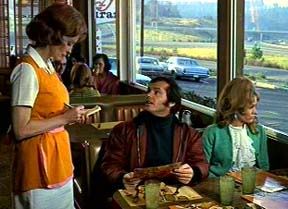
As you read the premise of the film as stated, you may begin to notice that the film came at the time when rebellion movements were the voices of the films, and the film could not be more attuned to that. Released in 1969, Five Easy Pieces marvels through its steady pace that once you get hold of it, you will be taken further to an achingly real life-like story of how one lives his life that often is bleak, yet unintentionally comic at times.
In his youthful menacing act, Nicholson shows his comprehensive understanding that to carry a multi-dimensional character, one’s got to inhabit it from within. Thus, we see his being a tormented guy trapped in his own ego as a highly-educated pianist, yet having to face the reality of being stuck in a mindless job that plunges him deeper to endless soul-searching, only hurting the people he initially cares about. Eventually, we will accept any seemingly evil doings he led himself to, from being abusive to philandering, for they serve to strengthen his misled behaviour.

As you read the premise of the film as stated, you may begin to notice that the film came at the time when rebellion movements were the voices of the films, and the film could not be more attuned to that. Released in 1969, Five Easy Pieces marvels through its steady pace that once you get hold of it, you will be taken further to an achingly real life-like story of how one lives his life that often is bleak, yet unintentionally comic at times.
Feb 4, 2006
McCabe & Mrs. Miller
The idea of Western world as cold and frozen as captured in McCabe & Mrs. Miller may recall the lonely and almost-empty atmosphere of a kingdom in England in The Lion in Winter, since both films brought out contrast looks of their respective background as commonly perceived, yet the strong elements of both genres still convincingly present in the films, either to enhance the genre or to serve as a supporting backdrop.
The former film as discussed here decided to bask itself under the heavy thick of snow, somehow confining the brass loud of Western as usually appeared on the screen, particularly the Western films made in this era, mid-1960s to early-1970s, when Sergio Leone did not hesitate to downgrade the genre with uncomforting violence, at the same time when John Wayne was still around to maintain the dignity of the genre through traditional values of good deeds over evil doings, in a very two-dimensional way at the very best.
The confinement itself then is redeemed by the presence of the two leading characters with their unique traits considered as a breakthrough then. Warren Beatty’s McCabe is an opportunist who often confuses himself with his indecisiveness. He deliberately suppresses himself from his past that made him what he is, yet eventually he surrenders to the past, his own reputation, to a very unfortunate result at the end. It is understandable then that he carries his gloominess throughout the entire film, making each scenes he appeared seemed to be palpable to swallow.
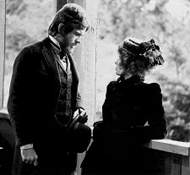
However, the same cannot be said towards Julie Christie, the saving grace of the film. Thanks to her radiant presence shining through her feisty acts, Christie turns her Mrs. Miller as a multi-dimensional character with a mere single look as represented by her generous eyes that speak many things themselves. It is hardly any wonder then that Robert Altman chose to end this film with the camera zooming in Christie’s bewildering eyes, something we seldom see in recent times until another film, Facing Window, does it with the same satisfying effect.
And isn’t that a rarity to see a Western film is almost entirely carried out by a mere presence of the leading lady character? Another breakthrough indeed, from Altman at his playful time in accordance to his famous M.A.S.H..
The former film as discussed here decided to bask itself under the heavy thick of snow, somehow confining the brass loud of Western as usually appeared on the screen, particularly the Western films made in this era, mid-1960s to early-1970s, when Sergio Leone did not hesitate to downgrade the genre with uncomforting violence, at the same time when John Wayne was still around to maintain the dignity of the genre through traditional values of good deeds over evil doings, in a very two-dimensional way at the very best.
The confinement itself then is redeemed by the presence of the two leading characters with their unique traits considered as a breakthrough then. Warren Beatty’s McCabe is an opportunist who often confuses himself with his indecisiveness. He deliberately suppresses himself from his past that made him what he is, yet eventually he surrenders to the past, his own reputation, to a very unfortunate result at the end. It is understandable then that he carries his gloominess throughout the entire film, making each scenes he appeared seemed to be palpable to swallow.

However, the same cannot be said towards Julie Christie, the saving grace of the film. Thanks to her radiant presence shining through her feisty acts, Christie turns her Mrs. Miller as a multi-dimensional character with a mere single look as represented by her generous eyes that speak many things themselves. It is hardly any wonder then that Robert Altman chose to end this film with the camera zooming in Christie’s bewildering eyes, something we seldom see in recent times until another film, Facing Window, does it with the same satisfying effect.
And isn’t that a rarity to see a Western film is almost entirely carried out by a mere presence of the leading lady character? Another breakthrough indeed, from Altman at his playful time in accordance to his famous M.A.S.H..
Magnolia
“I'll tell you the greatest regret of my life. I let my love go”.
Then my only regret would be of not watching one of the most powerful dramatic ensemble films ever produced and released amidst the chaotic of mindless and plotless films these days.
What glued one to the seat throughout the entire 195-minute duration lies on the parallel lines of many souls living their lives right in front of us, no matter if you see it on a big screen or small ones, which actually serve as a mirror to what we really are. From the first 10 minutes of puzzling images spanning through decades of human (in)decencies as visualized through quick-cut editings, we seem to be asked to trace our roots that lead us to what we are today.
Thus, in one rainy day of Los Angeles where many intricated stories of life begins, Magnolia starts depicting and exploiting ourselves through the impossible list of characters as portrayed by impossibly talented actors at their best.
At once, we are asked to redeem our sins in the past by suffering from painful pains, both literally and mentally.
Other times, we wish to break ourselves free from any haunting commitment as told to us regularly on daily basis.
Occasionally, we do not realize how little lies as we started imagining from our youth has become a life on its own, trapping us inside that only wounding us everytime we make an attempt to get out of it.
Worse, sometimes we realize that it is only too late to show our deepest affection to our beloved ones.
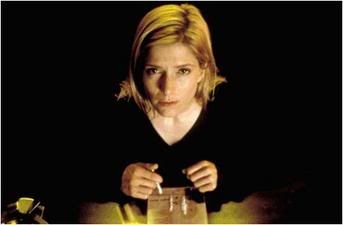
As the characters start unravelling their masks and allowing us to touch their wounds, the film works as a paradigm that strikes hard to our mind without even being preachy. Those opposing the film may question the necessity of cursive languages, but this opposing team may not realize the aching reality the film grounds itself, that behind the seemingly ruthless acts, it is the hearts yearning for acknowledgement of existence that speaks at their loudest.
Through Tom Cruise’s perfectly-fit annoying charisma, through Julianne Moore’s heart-rending acute portrayal of a tormented spouse, through Melora Walter’s emotional grievances, through our sympathetic nods to William H. Macy’s abused character, we finally realize that these people are pieces of what made the film compelling to watch, all while we are kept reminded that:
“We might be through with the past, but the past ain't through with us”
Then my only regret would be of not watching one of the most powerful dramatic ensemble films ever produced and released amidst the chaotic of mindless and plotless films these days.
What glued one to the seat throughout the entire 195-minute duration lies on the parallel lines of many souls living their lives right in front of us, no matter if you see it on a big screen or small ones, which actually serve as a mirror to what we really are. From the first 10 minutes of puzzling images spanning through decades of human (in)decencies as visualized through quick-cut editings, we seem to be asked to trace our roots that lead us to what we are today.
Thus, in one rainy day of Los Angeles where many intricated stories of life begins, Magnolia starts depicting and exploiting ourselves through the impossible list of characters as portrayed by impossibly talented actors at their best.
At once, we are asked to redeem our sins in the past by suffering from painful pains, both literally and mentally.
Other times, we wish to break ourselves free from any haunting commitment as told to us regularly on daily basis.
Occasionally, we do not realize how little lies as we started imagining from our youth has become a life on its own, trapping us inside that only wounding us everytime we make an attempt to get out of it.
Worse, sometimes we realize that it is only too late to show our deepest affection to our beloved ones.

As the characters start unravelling their masks and allowing us to touch their wounds, the film works as a paradigm that strikes hard to our mind without even being preachy. Those opposing the film may question the necessity of cursive languages, but this opposing team may not realize the aching reality the film grounds itself, that behind the seemingly ruthless acts, it is the hearts yearning for acknowledgement of existence that speaks at their loudest.
Through Tom Cruise’s perfectly-fit annoying charisma, through Julianne Moore’s heart-rending acute portrayal of a tormented spouse, through Melora Walter’s emotional grievances, through our sympathetic nods to William H. Macy’s abused character, we finally realize that these people are pieces of what made the film compelling to watch, all while we are kept reminded that:
“We might be through with the past, but the past ain't through with us”
Feb 1, 2006
Intimate Strangers
Funny how often cases of mistaken identities would lead to some surprises, be them pleasant, irritating, thrilling, or a little mixture of all of them. And that’s how Intimate Strangers tells its story, with a very much subdued eroticism that often raises hairs behind your neck, a little bit.
But what makes the film appealing is how it derives its playful theme. For sure, the story of how strangers get intimate to one another after planted coincidences, no puns intended to the title, has been told many times in numerous films, yet Patrice Leconte magically directs the film and gives the story a suspense feeling through the film’s original score as done by Pascal Esteve which reminds a lot to Bernard Herrmann’s collaborations with Alfred Hitchcock’s in the latter’s best works. The score is visually matched with Eduardo Serra’s unusual angle of how camera looks at the two leading characters revealing themselves as the film progresses that gives intimate feeling yet distancing us at the same time.

Thus, don’t force yourself to laugh to this widely-acclaimed film put as comedy by some critics. Instead, let yourself feel rooting for these characters to seduce you with their seductive wits.
Believe it or not, that’s a fun on its own.
But what makes the film appealing is how it derives its playful theme. For sure, the story of how strangers get intimate to one another after planted coincidences, no puns intended to the title, has been told many times in numerous films, yet Patrice Leconte magically directs the film and gives the story a suspense feeling through the film’s original score as done by Pascal Esteve which reminds a lot to Bernard Herrmann’s collaborations with Alfred Hitchcock’s in the latter’s best works. The score is visually matched with Eduardo Serra’s unusual angle of how camera looks at the two leading characters revealing themselves as the film progresses that gives intimate feeling yet distancing us at the same time.

Thus, don’t force yourself to laugh to this widely-acclaimed film put as comedy by some critics. Instead, let yourself feel rooting for these characters to seduce you with their seductive wits.
Believe it or not, that’s a fun on its own.
Subscribe to:
Comments (Atom)
My Profile

- Nauval Yazid
- Jakarta, Indonesia
- A film festival manager. A writer. An avid moviegoer. An editor. An aspiring culinary fan. A man.